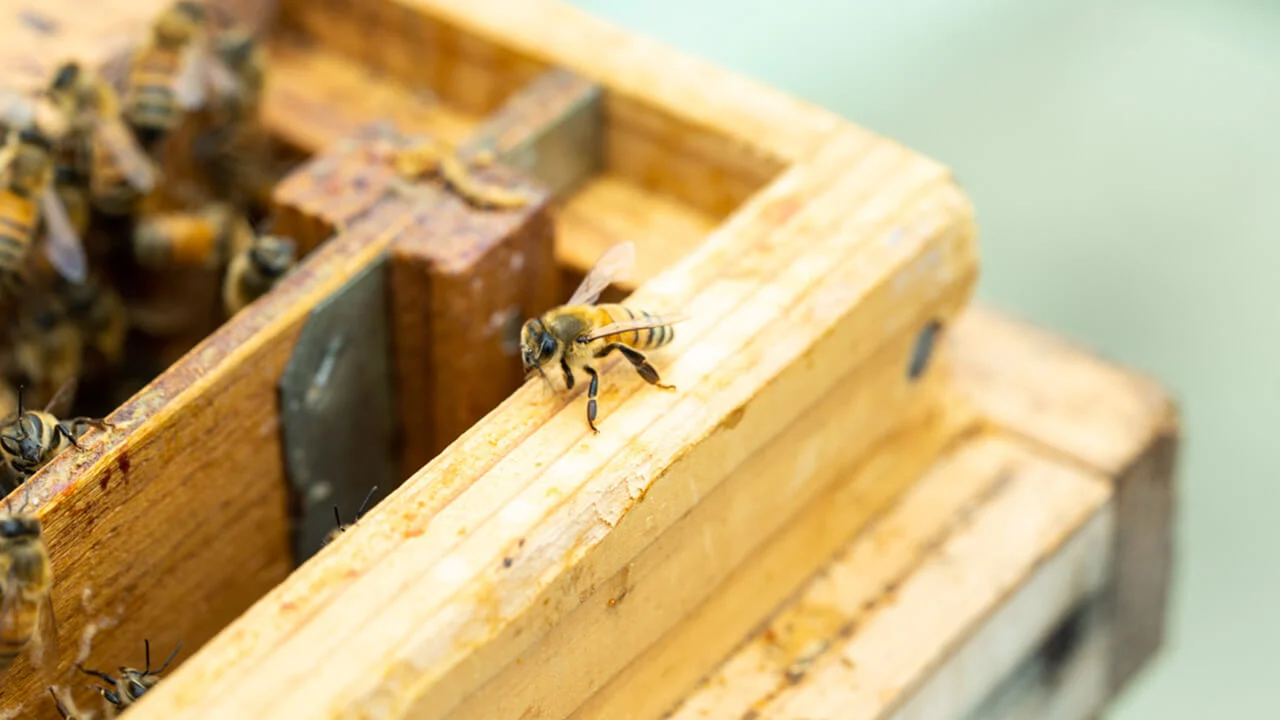

Sep 14, 2020
VISION & IDEAMr. Honeybee’s Sustainability Class
What we have learned from beekeeping at DENSO Headquarters
Have you ever wondered what the environment around you is like today? Is it in good or poor condition? Technology can provide data related to things like temperature, humidity, and atmospheric pressure, but is difficult to judge how well the environment is doing based on raw data alone.
How well are we coexisting with the environment? It is difficult to establish an objective index to make an accurate evaluation. The important thing is to try to listen to the voice of nature while interacting with it. In other words, we believe that it is important to experience and feel nature rather than simply interpreting numerical data.
Contents of this article
How our diet is affected by living things around us
The global environment continues to be damaged as society falls short of realizing significant changes to protect our planet.
Factories are considered majors contributors to environmental degradation. Now more than ever, manufacturing companies like DENSO, which operate factories as part of their core business activities, need to pay attention to and address environmental issues.

Changes in the environment can negatively impact ecosystems. A phenomenon believed to be caused by environmental problems is “Colony Collapse Disorder”, or the mass disappearance of honeybees. In Europe and North America, honeybee populations are decreasing, and there is a possibility that they will become extinct in the future.
What kind of changes could the decrease in the number of honeybees cause?According to a report by the United Nations Environment Programme (UNEP) in 2011, there are 100 crop species that provide 90 percent of the world’s food, and 70% of them are pollinated by bees.

It may come as s surprise, but the lives of humans and honeybees are more closely linked than we may expect. Many of the crops we eat every day are able to grow thanks to the help of honeybees. These include fruits like strawberries and apples, and vegetables such as cabbages, carrots, eggplants, and onions. If honeybees become extinct, much of the food that we take for granted would not be able to grow and reproduce, causing drastic changes in our diet.
Honeybees are considered “bioindicators” – species that help us assess the condition of the environment. Environmental issues are linked to their survival and, in turn, their survival affects our own. This is why, at DENSO, we are developing ways to live harmony with the environment by ensuring the continued existence of honeybees.
Continuous challenges with beekeeping - a health meter for the local environment
DENSO has long been involved in a variety of activities aimed at protecting the environment, from plant wastewater sanitation and CO2 recycling, to using bio-degradable materials, reforestation and urban waste clean-up.
There is no doubt that all of these activities are important, but it is difficult to see significant changes in the environment around us. So we asked ourselves, “Are these activities for the environment enough to continue our business activities in a sustainable manner?”
The “The Honeybee Project” was launched in order to find out how our activities are improving the environment and to develop ways to live in harmony with the planet. This project is an opportunity to better understand the environment around us, to implement environmental education and awareness programs, and consequently to help people learn more about greening activities and revitalizing local communities.


Terumitsu Kondo (DENSO UNITY SERVICE CORPORATION), who was assigned to this project, was confused at first and thought, “Why honeybees?”
Kondo said, “When I was asked by General Administration Division, I wondered if a company could grow honeybees. Then, I remembered there used to be comics where the main character was a honeybee. At the same time I still had doubts if I could be the one to be responsible for beekeeping.”
“The project first started in 2015, and we were engaged in beekeeping on the roof of the factory for a year.” Kondo recalls that beekeeping was more challenging than he thought. “First, I bought a hive for beekeeping. After a while, the queen bee disappeared, but I was not even aware of that at first.”

Kondo did his best to manage this beekeeping initiative even though he was often troubled by disappearing queen bees, and sometimes suffered from the pain and itchiness caused by bee stings. He also exterminated parasitic mites while being careful not to crush honeybee swarms. By overcoming many hardships, he gradually deepened his understanding of honeybees.
Kondo says, “Honeybees change the speed of their flight and the buzzing sounds that they make depending on how angry they are. When they are in a bad mood, the sound becomes louder. For example, when a bee finds a puddle, other bees gather to drink water. People tend to become anxious when they see large numbers of bees, so we put up a warning sign there for a while and make a watering place closer to the hive. I have come to know a lot about honeybees.”
He also recalls, “After gaining an understanding of beekeeping, we expanded our activities by recruiting volunteers from our employees. After more people joined the project, it became much easier to raise the bees. Some people have been working with us as volunteers for several years, and more people are now becoming familiar with beekeeping. Finding a queen bee among tens of thousands of bees is much easier with volunteers.”
Spending time with honeybees helps us see environmental problems as our own
Masayuki Kamiya (DENSO UNITY SERVICE CORPORATION) and Rumi Ogai (General Admin. Division) were also confounded when they first joined the honeybee project and started working with Kondo and volunteers who had already become familiar with beekeeping.
Kamiya said he was surprised many times to realize that there were a lot of things to learn about beekeeping.
Kamiya said, “I was transferred here in November 2019 and started participating in the honeybee project. I knew about the project, and was somewhat interested in the project as well. When I actually joined the project, I realized that it was more difficult than I had imagined. There were countless things I needed to remember about beekeeping. I have finally learned how to distinguish queen bees, but I still have a lot more to learn.”
Ogai says she was surprised at how hard it was to take care of the honeybees. “I thought the reason why there were many volunteers was because it was an activity that anyone could easily participate in during lunch break. However, in order to take care of the honeybees, we have to wear protective clothing during the daytime while the sunlight is very strong. I was really impressed by the volunteers who were working hard, while sweating and fearing that they might be stung by the honeybees.”

Kamiya, who previously struggled with beekeeping, says he is now getting used to it, and there seems to be various changes in his daily life. He says, “The way I think about eating honey has changed. A bee produces only a teaspoon of honey in its lifetime. I used to eat honey without thinking about things like that. After I started participating in the project, I began to think that humans are being given a surplus of precious honey that bees produce over a lifetime. Now, I know I have to appreciate honey when I eat it.”
Kondo says his participation in the honeybee project has changed his perspective in everyday life.
“I started to notice flying honeybees on my way to work. I did not know that there were enough flowers for honeybees to survive in a city area like this. The way I observe my surroundings in my daily life has changed. The beekeeping is affected by the weather, so I started to check the weather forecast every day. In addition, I became very sensitive to climate change.”

We can stay comfortable using air conditioners when it gets hot, but bees are different. Being involved in beekeeping, members of the honeybee project have now come to see environmental changes as their own. Ogai said she became sensitive to changes in the environment as well as major issues like climate change.
“If the honeybees cannot live in an environment, it means that the nature within that environment is not abundant. I feel relieved that honeybees, which are very sensitive to environmental changes, are able to live around us. At the same time I hope to create an environment where honeybees can live without human intervention. There is a saying that goes: “The farther a bee flies, the shorter it lives”. So I have come to realize how important it is to green the surrounding area to ensure that honeybees can survive.”
Beekeeping is a big burden and requires hard work. However, through continuous effort, people involved in the project are learning more about honeybees, and about the complexity and importance of living in harmony with the environment.
Communicating with nature and experiencing symbiosis
Through beekeeping, we are trying to develop an index for measuring whether we are coexisting well with the environment. Although this may not be possible to represent as numerical data, this aligns with DENSO’s belief in the value of “personally experiencing something on site”.
DENSO is committed to minimizing the environmental impact of energy generated across all aspects of its business activities and throughout the production cycle – from the generation and use of energy, to its disposal.
If our concerns were limited to business, we could probably find a more efficient way.
However, we do not want to focus solely on improving efficiency for our business. The time we have spent with honeybees has taught us the importance of interacting respectfully with the ecosystem in order to protect the environment.

REACTION
Changing your "Can'ts" into "Cans"
Where Knowledge and People Gather.




Leave a comment